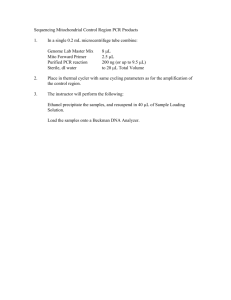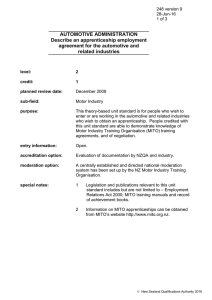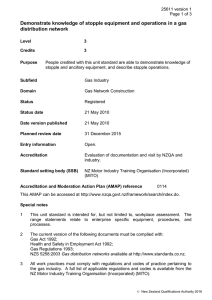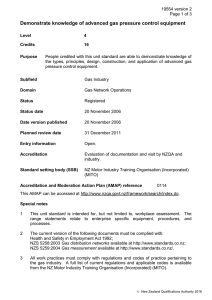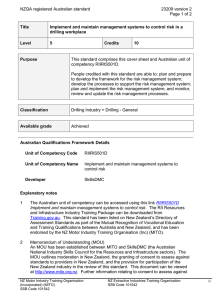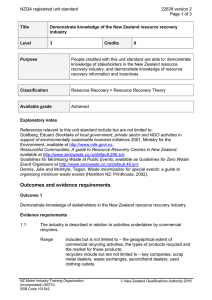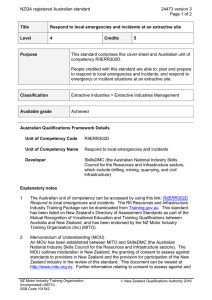investment plan
advertisement
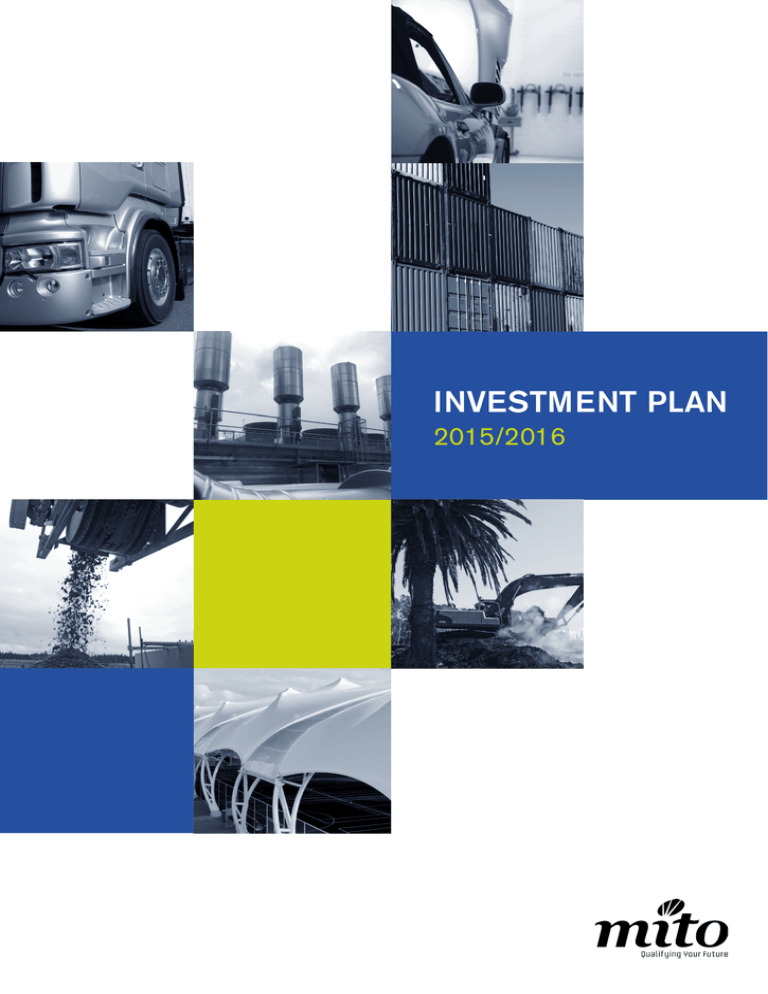
INVESTMENT PLAN 2015/2016 01/ MITO’S CORPORATE PROFILE MITO New Zealand Incorporated (MITO) is the industry training organisation with gazetted coverage for the automotive, road transport, passenger services, stevedoring and ports, warehousing and logistics, industrial textile fabrication, extractives (drilling, mining, quarrying), oil and gas (energy and chemical plant, gas, petrochemical), and resources (protective coatings, resource recovery) industries. LEGISLATIVE REQUIREMENTS The Industry Training and Apprenticeships Act 1992 specifies the mandated and legislated obligations of industry training organisations. This includes developing and maintaining skill standards; developing and maintaining arrangements for the delivery of industry training; compliance with prescribed quality assurance requirements and conditions of recognition; and providing for collective representation of employees in the governance of the organisation. Industry training organisations must also have regard to the needs of Maori and other population groups identified in the tertiary education strategy issued under section 159A A of the Education Act 1989. VISION Empowering individuals and enterprises to achieve their full potential. MISSION Enhance the productivity and performance of the industry groups we serve by identifying and meeting their current and future skill development needs to international standards. PURPOSE STATEMENTS (i) facilitate education and training solutions consistently across New Zealand, for anyone who seeks to advance their career in industries for which MITO has gazetted coverage (ii) develop and promote career pathways to support a productive and dynamic workforce, skilled to international standards (iii) design New Zealand qualifications that are quality assured and internationally recognised and valued (iv) resource our industries for the future by collaborating on skill and workforce planning requirements (v) meet our legislative responsibilities and exceed our stakeholder expectations. GOVERNMENT MANDATE The Tertiary Education Strategy 2014-2019 sets out the Government’s long-term strategic direction for tertiary education. The strategy focuses on ensuring New Zealand has an outward-facing and engaged tertiary education system, with strong links to industry, community and the global economy. There are six priorities: (i) delivering skills for industry (ii) getting at-risk young people into a career (iii) boosting achievement of Maori and Pasifika (iv) improving adult literacy and numeracy (v) strengthening research-based institutions (vi) growing international linkages. Boosting skills and employment are reflected in the Government’s Better Public Service targets ensuring that 85 percent of 18-year olds will have NCEA level 2 (or equivalent) and that 60 percent of 25 to 34-year olds will hold a qualification at level 4 in 2018. STRATEGIC PARTNERS MITO’s strategic partners include industry associations, corporate entities, tertiary education organisations, secondary schools, government agencies and offshore providers. All partnerships are based on realising successful outcomes for our learners. GOVERNANCE MITO is governed by an independent Board of Directors. MANAGEMENT The Chief Executive and senior leadership team apply four core principles which drive the actions and support the intentions of all business activities: (i) outcome orientated: ensuring that our decision-making is focused on, and supports, the results we are aiming to achieve (ii) forward thinking: taking a longer-term perspective; focusing on our future environment and direction (iii) customer centred: focusing on our customers’ needs and the implications for our other stakeholders (iv) accountable and transparent: recognising that we are accountable to our members and other stakeholders for the stewardship of the organisation and the prudent use of public funds. STRATEGIC PRIORITIES 2015/16 For 2015/2016 the MITO Board, Chief Executive and senior leadership team have established four strategic priorities, aligned to the Government’s objectives and industry imperatives: (v) skills leadership (i) customer value proposition (ii) innovation and growth (iii) system and organisational performance. MITO will achieve this through Partnership and Collaboration; a focus on delivering Quality outcomes through Strategic Platform 2016 and - 2018 consistently high Performance. Skills Leadership Customer Value Proposition We inspire educational excellence and success We drive participation and achievement Partnership Collaboration Quality Performance Innovation and Growth We champion workforce development and industry growth System and Organisational Performance We fulfil our objectives through sound business practices ACCOUNTABILITY MITO’s key accountability documents include: • The Constitution - contains comprehensive information on the purpose and objectives of the organisation, including membership, governance, decision-making procedures, responsibilities, finance and audit procedures. • The Annual Report - provides information about MITO’s initiatives and financial performance. • The Business Plan - a working accountability document between the Chief Executive and the MITO Board, aligning MITO’s business goals and objectives with the four strategic priorities. • Stakeholder Engagement Strategy - outlines MITO’s high-level stakeholder engagement and communications strategy and is supported by the annual Marketing, Communications and Sponsorship Plan. • Responsiveness Strategy - contains MITO’s strategy for increasing the participation and educational achievement of under-represented groups. This includes literacy and numeracy support through implementation of the assessment tool designed for Maori learners and creating and building relationships with Maori and Pasifika Trade Training initiatives. • Performance Commitments - are negotiated with the Tertiary Education Commission. MITO’s performance is measured through two educational performance indicators - credit achievement and programme completion. • Customer satisfaction survey - MITO has carried out a survey annually since 2001. The results are used to monitor organisational performance, and help identify areas for organisational improvement to better help industries meet their current and future skill development. David O’Kane Janet Lane CHAIRMAN, MITO CHIEF EXECUTIVE, MITO 02/ APPENDIX MITO’s Industries Source: Statistics NZ business statistics annual snapshot - as at February 2015 MITO industry firms Approximately 31,400 firms employing 156,000 people in industries MITO serves. 43% Transport and Logistics industries 0.5% Industrial Textile Fabrication industry 8% Extractive industries 46% Automotive industry Accounting for 7% of the total workforce MITO industry MITO industry employees employee location 33% in Auckland region 7% in Bay Of Plenty region 10% 44 is the average age of MITO industry employees 78% are male in Waikato region 9% (compared to 53% of the total workforce) in Wellington region 13% in Canterbury region 78% European 16.6% 48% 13% Maori have no qualification have no post school qualification 7.7% Asian (compared to 43.1% of the total workforce) 5.6% Pacific (compared to 13.6% of the total workforce) Level 10, 79 Boulcott Street PO Box 10803, The Terrace Wellington 6143, New Zealand 0800 88 21 21 info@mito.org.nz mito.org.nz
